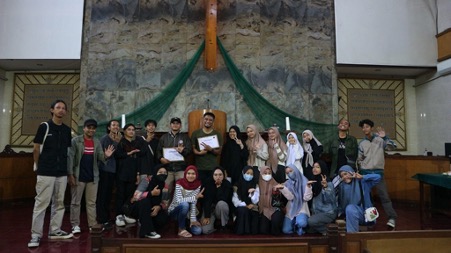Visit to Mergangsan Christian Javanese Church

Students of Religious Studies, Saturday, November 05, 2022, visited the Mergangsan Christian Javanese Church on Jl. Taman Siswa No.166, Wirogunan, Kec. Mergangsan, Yogyakarta. This visit was hosted by the resource person Rev. Hendra, a 4th generation pastor, along with Mr. Arafat Noor Abdillah, as the moderator.
A brief history of Mergangsan Christian Javanese Church was discussed by Rev. Hendra before he discussed the church in Central Java. In the beginning, the teachings of Christianity were brought by the Dutch, although the focus was not on theological teachings but on health and hospital construction. As Christianity spread in Central Java, it was tucked between these main objectives. The pioneer of the formation of the Javanese church was Rev. Satra. This idea was realized because of the loss of original Indonesian culture in the church, which occurred at that time when people entered Christianity in search of security rather than faith, which led to concerns that the congregation no longer knew their own culture due to Western culture greatly influencing the teachings of Christianity.
At first the Mergangsan Christian Javanese Church was named the Tungkak Javanese Church. This church was officially established on March 15, 1925 with 15 members. This church was built by the Gondokusuman Christian community which initially aimed to raise the "kampung kere" and the economic welfare of the community.
The Mergangsan Javanese Christian Church still uses Javanese traditions, such as the commemoration of death on the first, third, seventh, 40 days, 100 days, 1 year, 2 years, and 3 years. According to Christianity, the soul of a deceased individual has no further connection with the world. This death commemoration is not obligatory, because this tradition is used to pray for the family left behind, not the deceased.
Currently the Mergangsan Christian Javanese Church has grown with a congregation of around 1459 people, 20 of whom are members of PEJ (Economic Development of the Congregation) whose financial needs are fully covered until death, and around 12 other people are recipients of educational scholarships from the church. The development of the church in fixing economic problems can be emulated as a form of concern for fellow God's creatures.
"Hopefully this visit can be an event to implement things that have been learned in lectures," the person in charge of the visit, Ibnul Hafiz, said.
